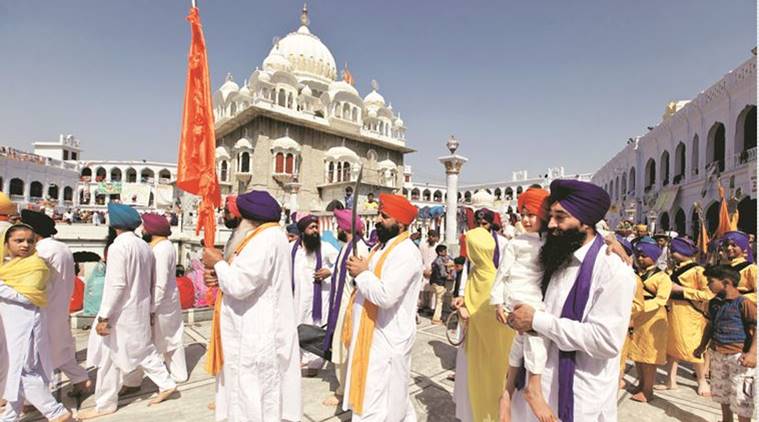 Sikh pilgrims at Gurdwara Panja Sahib in Pakistan. (AP)
Sikh pilgrims at Gurdwara Panja Sahib in Pakistan. (AP)
India has lodged a strong protest with Islamabad for preventing visiting Sikh pilgrims from meeting Indian diplomats and consular teams in Pakistan. The Ministry of External Affairs (MEA), in a statement on Sunday, said the Indian High Commissioner to Pakistan was also “compelled to return” while he was on his way to meet the pilgrims. This comes weeks after New Delhi and Islamabad decided to resolve the crisis arising out of harassment and intimidation of diplomats and their families.
“A jatha of around 1,800 Sikh yatris has been travelling in Pakistan from April 12, under a bilateral agreement on facilitating visits to religious shrines,” said the MEA. “A standard practice has been that the Indian High Commission’s consular/ protocol team is attached with visiting pilgrims, to perform consular and protocol duties, like helping out in medical or family emergencies. However, this year, the consular team has been denied access to Indian Sikh pilgrims.
The team could not meet the pilgrims on their arrival at Wagah Railway Station on April 12. Similarly, it was denied entry into Gurdwara Panja Sahib on April 14, for a scheduled meeting with pilgrims there. The High Commission was thus prevented from performing basic consular and protocol duties for Indian citizens,” it said.
The MEA said that on Saturday, the Indian High Commissioner to Pakistan, who was scheduled to visit Gurdwara Panja Sahib at the invitation of the Chairman of the Evacuee Trust Property Board (ETPB), was “suddenly asked to return while en route to the shrine, for unspecified ‘security’ reasons”. “The High Commissioner, who was to greet Indian pilgrims on the occasion of Baisakhi, was thus compelled to return without meeting Indian citizens,” it said.
The MEA said that India has lodged a strong protest with Pakistan against this “inexplicable diplomatic discourtesy”, pointing out that these incidents constitute a clear violation of the Vienna Convention of 1961, the bilateral Protocol to visit Religious Shrines, 1974 and the Code of Conduct (for the treatment of diplomatic/consular personnel in India and Pakistan) of 1992, recently reaffirmed by both countries.
Meanwhile, the Pakistan’s Foreign Ministry spokesman rejected the allegations as “baseless”, and said it was “deeply regrettable” that facts had been “completely distorted and misrepresented”. According to the statement issued by Pakistan’s Foreign Ministry, the Secretary of the Evacuee Trust Property Board (ETPB) had extended an invitation to the Indian High Commissioner to attend the Baisakhi and Khalsa Janamdin function at the Gurdwara Panja Sahib on Saturday. The statement said travel permission was promptly granted.
“However, in the run-up to the main function, the ETPB authorities noticed strong resentment among segments of Sikh yatris, gathered there from different parts of the world, protesting the release in India of some film on Baba Guru Nanak Devji. Considering an emotionally charged environment and the possibility of any untoward situation, the ETPB authorities contacted the Indian High Commission officials and suggested cancellation of the visit. The Indian High Commission officials, after due deliberation, conveyed back to ETPB their agreement to call off the visit in view of such a situation. The ETPB acted with sincerity and in good faith, and the cancellation took place with mutual understanding,” said the statement.
Later on Saturday, however, the matter was raised with the Foreign Office in Islamabad and the Pakistan High Commission in New Delhi and a “protest” was lodged. “In response, the factual position was duly communicated to the Indian side, both in Islamabad and New Delhi. Despite that, we have seen that a wrongful version has been presented to mislead the public opinion,” said the Pakistan Foreign Ministry’s statement.
“The matter relating to the protocol team’s access on the arrival of the jatha at Wagha was expeditiously resolved through the intervention of the Ministry of Foreign Affairs. However, the concerned officials of the Indian High Commission chose not to return, although they were duly notified that the requisite clearance has been granted. On 14 April, there was no scheduled meeting with pilgrims. Today, i.e. 15 April, the officials of Indian High Commission have duly visited Gurdwara Punja Sahib,” it said.
“We deeply regret this Indian attempt to generate controversy around the visits of Sikh pilgrims and to vitiate the environment of bilateral relations,” it said. “It is ironic for the Government of India to accuse Pakistan of violating the 1974 Protocol on Visits to Religious Shrines, whereas it is the Indian Government that has, in clear violation of the Protocol, twice within this year denied visas to Pakistani pilgrims on occasions of Urs of Hazrat Nizamuddin Auliya and Khwaja Moinuddin Chishti Ajmeri and scuttled at least three visits of Sikh and Hindu pilgrims to religious shrines in Pakistan since June 2017,” the statement said.